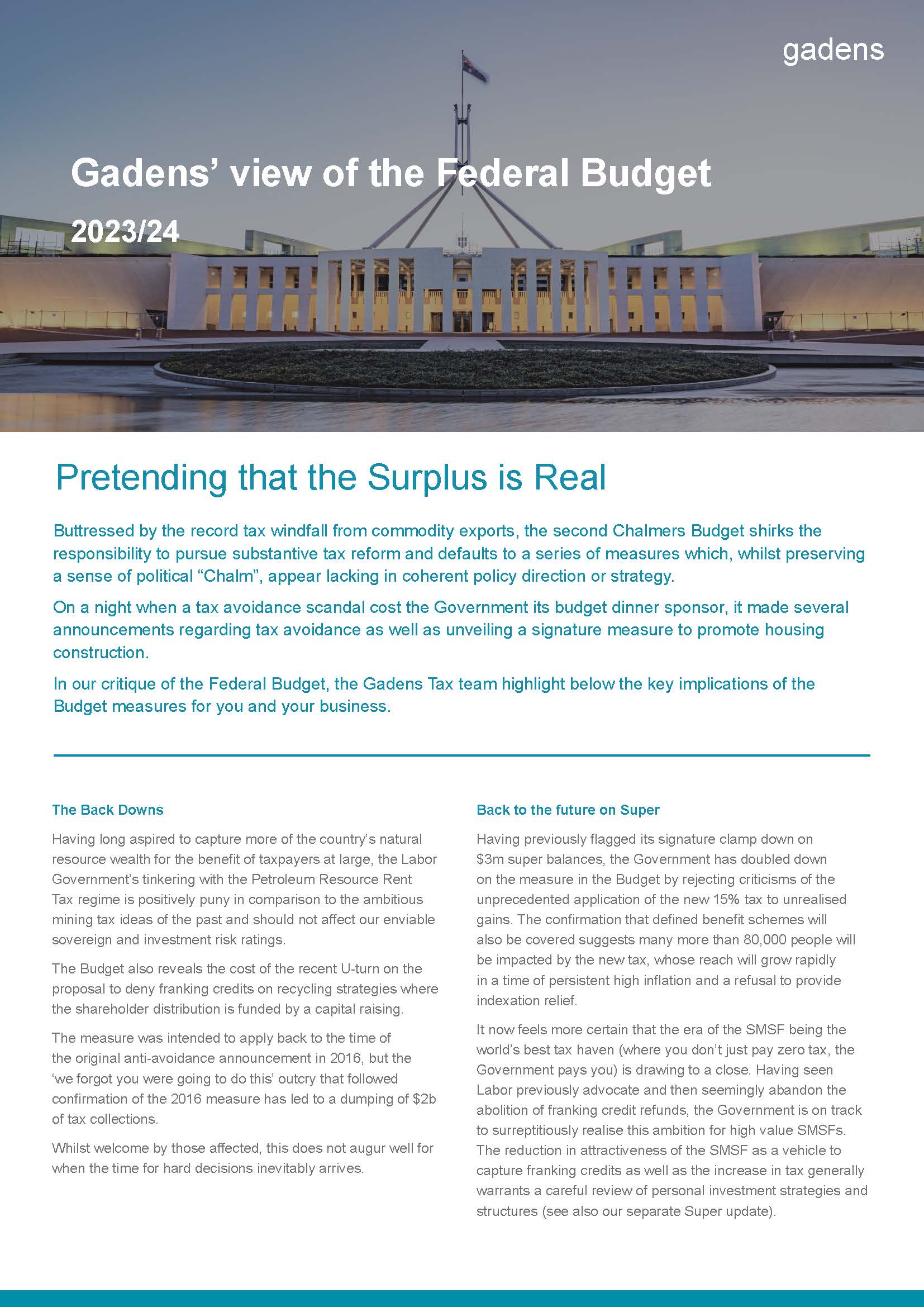Pretending that the Surplus is Real – Gadens’ take on the Federal Budget
Buttressed by the record tax windfall from commodity exports, the second Chalmers Budget shirks the responsibility to pursue substantive tax reform and defaults to a series of measures which, whilst preserving a sense of political “Chalm”, appear lacking in coherent policy direction or strategy.
On a night when a tax avoidance scandal cost the Government its budget dinner sponsor, it made several announcements regarding tax avoidance as well as unveiling a signature measure to promote housing construction.
In our critique of the Federal Budget, the Gadens Tax team highlight the key implications of the Budget measures for you and your business.
The Back Downs
Having long aspired to capture more of the country’s natural resource wealth for the benefit of taxpayers at large, the Labor Government’s tinkering with the Petroleum Resource Rent Tax regime is positively puny in comparison to the ambitious mining tax ideas of the past and should not affect our enviable sovereign and investment risk ratings.
The Budget also reveals the cost of the recent U-turn on the proposal to deny franking credits on recycling strategies where the shareholder distribution is funded by a capital raising. The measure was intended to apply back to the time of the original anti-avoidance announcement in 2016, but the “we forgot you were going to do this” outcry that followed confirmation of the 2016 measure has led to a dumping of
valid tax collections.
Whilst welcome by those affected, this does not augur well for when the time for hard decisions inevitably arrives.
Back to the future on Super
Having previously flagged its signature clamp down on $3m super balances, the Government has doubled down on the measure in the Budget by rejecting criticisms of the unprecedented application of the new 15% tax to unrealised gains. The confirmation that defined benefit schemes will also be covered suggests many more than 80,000 people will be impacted by the new tax, whose reach will grow rapidly in a time of persistent high inflation and a refusal to provide indexation relief.
It now feels more certain that the era of the self-managed super funds (SMSF) being the world’s best tax haven (where you don’t just pay zero tax, the Government pays you) is drawing to a close. Having seen Labor previously advocate and then seemingly abandon the abolition of franking credit refunds, the Government is on track to surreptitiously realise this ambition for high value SMSFs. The reduction in attractiveness of the SMSF as a vehicle to capture franking credits as well as the increase in tax generally warrants a careful review of personal investment strategies and structures (see also our separate Super update).
Anti-Avoidance
The practice of Treaty Shopping undertaken by foreign investors to access lower withholding tax rates on payments such as royalties and dividends is being targeted by amending the general anti-avoidance rules (Part IVA) to include schemes that reduce (not just avoid entirely) the amount of withholding. This is a more direct way of targeting these practices than relying on the limitation of benefits restrictions that are built into Treaties that have favourable withholding tax rates.
The Government has also confirmed it is adopting the OECD mandated 15% global minimal tax regime applying to large multinationals, albeit conceding that given our locally high 30% corporate tax rate this will not have a material impact on tax revenue.
The surprise announcement which applies domestically is GST. The Government believes that at least $2b annually is being avoided and has forecast to capture this revenue through investment in AI and other analytical tools. We are not seeing GST compliance failures (at least not deliberate ones) to suggest shortfalls of this magnitude, however there may well be widespread system errors resulting in latent non-compliance and it may be worth conducting a review of your GST compliance systems before the ATO bot contacts you first.
Turbocharging apartment construction
As previously foreshadowed, the Government is reintroducing a 25 year building write-off for 50+ apartment projects which meet the new Build to Rent criteria, which include a 10 year minimum ownership period and minimum 3 year rental agreements. A 25 year write-off for residential buildings (compared to the usual 40 years) has not been a feature of the Australian tax system since the mid-1980s. We certainly hope this is not a reflection of the state of repair of the new buildings in 25 years.
Build to Rent projects will also be eligible investments for Managed Investment Trusts (MITs) that withhold only 15% on profits paid to foreigners. The combination of the 15% MIT rate and the 4% annual building write off will provide foreign investors with negligible tax leakage on cash distributions and is expected to generated a boom in large apartment developments.
The impact of these changes is very welcome for the local property and construction sector at a challenging time in the cycle, and should make a significant impact on housing accessibility.
It is somewhat ironic however to see an expansion in property tax concessions, given previous policies aimed at curtailing negative gearing and property deductions generally. At the same time, the patent box regime, which was a tentative step at a preferential tax regime for the innovation sector, is being dumped altogether and highlights our concerns about the Government’s appetite for tax reform.
Pay Day Super
All employers now have 3 years to align their employee payment systems so that super is contributed together with salary and wages. Whilst this will result in some cash flow cost to employers, it’s also another prompt to review payment calculations and correct some of the inevitable errors that arise given the complexity of employer obligations. Long term, this should have a positive impact for all stakeholders, including a reduction in costs and penalties which inadvertently arise due in part to super having its own payment regime.
If you found this insight article useful and you would like to subscribe to Gadens’ updates, click here.
Authored by:
Peter Poulos, Partner
David Coombes, Partner
Biljana Apostolova, Partner
Sean Prater, Special Counsel




